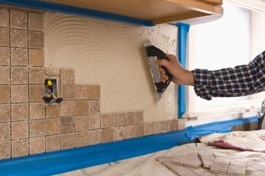Homeowners Willing to Tackle Remodeling Projects

By Kathleen Lynn  Print Article
Print Article
RISMEDIA, February 25, 2011—(MCT)—Homeowners who put off renovations during the recession are thinking about spending money on their properties again.
Take Barbara Moreno and Robert Ptaszynski of Washington Township, N.J., who delayed plans to add a second story to their ranch house when the recession hit their industries—automobiles and title insurance—hard.
Now they’re ready to move forward, because they feel more confident about the economy. “Things seem to be—knock on wood—settling down a little bit,” Ptaszynski said this week at the Home Show in Secaucus, N.J.
Contractors said that customers seem willing to spend again—but cautiously.
“People have been procrastinating for almost three years now,” said Joe Tighe of Complete Roof Systems in Dumont, N.J. During the recent economic hard times, homeowners were more likely to ask about patching and repairing, rather than replacing, their roofs. But now, they seem more willing to tackle the big jobs, he said. “The general mood I get from people is that they’re ready to spend money again,” Tighe said.
After homeowners slashed their spending during the recession, housing analysts say the remodeling industry is poised for a bit of a revival. According to the Joint Center for Housing Studies at Harvard, spending on remodeling is expected to rise 4-6% this year, as long as the job market and economy continue to recover.
“We don’t expect spending to rebound to the heights that we saw during the housing boom; that was unsustainable,” said Abbe Will, an analyst at the Harvard center. “But we’re in a better place now than we were a year ago. As long as the economy continues to improve, homeowners will have more confidence and be more willing to use their savings to make improvements that they’ve likely been putting off for a couple of years.”
Tax credits for energy-efficient improvements will also help buoy the market, said Will. And buyers who move into foreclosed properties over the next several years will probably have to spend significant amounts on home improvements, because those properties are typically neglected.
Ray Engel of Sierra Landscape Design and Garden Center in Wanaque said he was approached at the home show by several people who said they had bought foreclosed homes and need to update the landscaping.
But it’s clear that homeowners continue to watch their budgets. “Everybody’s looking for a better deal,” said Gary Townsend of The Kitchen Guy in Little Falls.
Homeowners interviewed at the at the home show, which ran for three days at the Meadowlands Exposition Center, want to make sure their homes work right, not spend tens of thousands on luxury upgrades. Janice Campbell of Cliffside Park, for example, wants to renovate her bathroom because the tub is leaking.
“It needs to be done, but it doesn’t mean I go overboard,” said Campbell, who is retired. “It has to fit within the budget.”
Similarly, Sharon and David Berger of Teaneck are considering a renovation of their main bathroom, which is original to their 1950s split level, because the shower isn’t working properly. “What I’m doing now is getting an idea of what things cost,” said Sharon, who runs a promotional advertising business. “I’m not jumping to spend. I’m not convinced that the economy is where it needs to be for me to consider spending money like this.”
Several of the contractors at the show said they are benefiting from homeowners’ thrift. Lucia Portali Waters of Fabu Designs by Lucia in Hasbrouck Heights said that when times were good, affluent homeowners hired her to paint murals and apply decorative wall and ceiling finishes.
Recently, however, she’s been painting and refinishing furniture and kitchen cabinets for customers who want to be practical and save money. “They don’t want to rip out their cabinets,” she said. “They’re not replacing; they’re refinishing.”
James Saluzzi of Emerson Construction Corp. in Emerson said he’s seen the same thing. He worked recently on updating a kitchen in Old Tappan, where the homeowner had the walls painted, the cabinets refinished and a new backsplash installed. “Five years ago, he would have ripped the whole thing out,” Saluzzi said.
(c) 2011, North Jersey Media Group Inc.
Distributed by McClatchy-Tribune Information Services.

